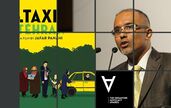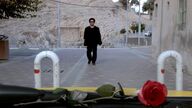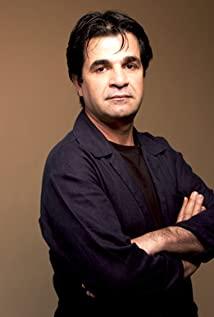A dramatic scene appeared on the red carpet after the 2015 Berlin Film Festival awards ceremony. The Golden Bear trophy, which symbolizes the highest honor, stood alone on the red carpet, and the Iranian director Panasi, who should have picked it up, is being supervised by the government in China. , Unable to go abroad. For the director who made such an interesting, rebellious and self-reflexive masterpiece, it is really a pity.
Jaffa Panasi was the first to work with the Iranian film master Abbas. The setting and narrative structure of this film also borrowed from the ten rhythms of life in Abbas' films. Like other Iranian directors, in order to avoid harsh censorship, his early works focused on children, but gradually turned to more controversial social issues such as the unfair treatment of women in Islamic society. These socially directed images aroused the dissatisfaction of the authorities. Panasi was accused of shooting films with political propaganda purposes to resist the Islamic government and was banned from filming for 20 years. Taxi is the third movie he shot after being banned. This movie continues his usual humanistic care and realistic aesthetic application. But unlike the previous two movies, the taxi has one more experience. The self-deprecating and relaxed bitterness of the latter does not lose strength.
Due to the limitation of the shooting conditions, all the pictures were shot by the dv in the car. The story of the film is very simple. The taxi driver played by the director himself wanders in Tehran and talks with all kinds of passengers who come up. The taxi is used as a medium for observing the society in the film. The long lens through the front windshield in the opening implies that the director will enter life through the window. Panasi sits in the driver’s seat and expresses himself. He will enter the film as an observer, but as the plot progresses, Panasi becomes stronger on the screen and begins to convey his point of view through dialogue. As viewers, we see two realities on the screen. One is the reality of Iranian society. We are at the same point of view as the director, and the second reality is when the director begins to dominate and be with his niece. When Hana directly discussed the censorship system, what we saw was Panasi’s own reality. After getting in the car, Hana has been talking about a school assignment. She wants to make a short film, but the teacher told her there are many restrictions. She has to make a film that can be released. Through the mouth of her niece, the director insinuates that she is restricted. Living situation.
As mentioned earlier, "Taxi" is a rebellious film and full of questioning spirit. In the middle of the movie, Hana used the camera to record that a bridegroom dropped his wallet, and the little boy on the side took the wallet as his own. Hana asked the boy to return the wallet, otherwise her movie would not be released, ha Na begged the boy to change his realistic behavior to match her in promoting good morality in the film. Here the director uses this absurd situation to satirize the absurdity of the censorship system. Let’s first think about a question. What is a movie? Although a movie is not completely real, it has a strong ability to simulate and reshape reality. The so-called realism is a quasi-realistic scene presented through careful arrangement. It is still born out of Observation and thinking of reality. Under the interference of censorship, the film loses this ability to imitate reality. Under the control of the political system, creators can only present the so-called acceptable reality that conforms to the ideology of the government authorities. This is in line with the film itself. Contrary to the potential of portraying reality. Through such a scene, Panasi leads the audience to question the images seen on the screen. If Hana succeeds in changing the boy's behavior, the reality presented on the screen will be changed and meet the requirements. In the subsequent dialogue between the director and his niece, he repeated this point many times. Hannah complained that the teacher told her that you want to present the truth, but if the reality is not good, don't shoot. Then what exactly should you shoot? Parnassi questioned the government's censorship system and invited the audience to question the credibility of the images they saw and actively seek truth from the images that have been altered. What is the point if the film can only show the changed reality?
At the end of the movie, a friend of the director gave him a rose and said that it was dedicated to all those who love movies. Then, the camera was aimed at the street outside the window through the front windshield, which echoed the opening shot, except that a rose was added in the foreground. In the last scene, the director and niece got out of the car, and several men supposedly sent by the government drove the car and tried to destroy the video. This flower is a symbol of love and passion for movies and it also carries Panasi's determination to continue creating. Those in power may have the power to control the creation of films, and there are ways to supervise those film workers who refuse to obey, but they cannot rob people of their love for films and want to express their desires freely, exposing reality. In the end, Panasi announced his willingness to continue shooting and completed his announcement in a beautiful way.
View more about Taxi reviews







